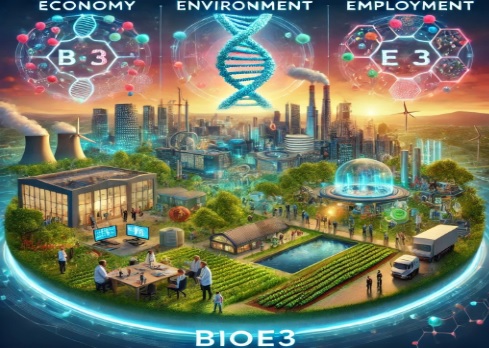- The BIOE3 Policy is a transformative framework designed to harness advanced biotechnology to drive economic growth, promote environmental sustainability, and create employment opportunities.
- Spearheaded by the Department of Biotechnology (DBT), this policy aims to revolutionize bio-manufacturing processes and catalyse a robust bio-economy in India.

Policy Objectives and Rationale
Establishing a Technological Framework
- Adoption of Advanced Technologies:
- The policy seeks to integrate cutting-edge biotechnological innovations into research and industrial processes.
- This involves leveraging engineered microbial, plant, and animal (including human) cells to produce high-value products with precision and scalability.
- Revolutionizing Bio-manufacturing:
- Bio-manufacturing, the process of using biological systems to produce commercially important products, is at the core of the policy.
- The aim is to develop processes that are more efficient, sustainable, and economically viable.
Strategic Bio-economy Target
- US $300 Billion Bio-economy by 2030:
- A key target of the policy is to achieve a US $300 billion bio-economy by 2030.
- The bio-economy encompasses the production, utilization, and conservation of biological resources, integrated with knowledge, technology, and innovation.
- This initiative is designed to benefit all economic sectors through enhanced product development, improved processes, and innovative services.
Implementation and Support Framework
Key Implementing Agency
- Department of Biotechnology (DBT):
- The DBT leads the implementation of the BIOE3 Policy.
- Through its coordinated efforts with industry, academia, and research institutions, the DBT ensures that the policy’s objectives are translated into practical, scalable solutions.
Innovation-Driven Support and Catalysis
- Research and Development (R&D) Focus:
- The policy includes targeted support for R&D and entrepreneurship across various thematic sectors.
- This approach is designed to foster innovation, accelerate translational research, and bridge the gap between laboratory discoveries and commercial applications.
- Bio-Artificial Intelligence (AI) Hubs:
- To further catalyze research and translational activities, the policy envisages the creation of integrated Bio-AI and Bio-manufacturing Hubs.
- These hubs will harness the power of artificial intelligence to optimize bio-manufacturing processes, enhance data analytics, and facilitate real-time decision-making in biotechnology.
Thematic Sectors of Bio-manufacturing
- The BIOE3 Policy prioritizes six key thematic sectors that are expected to drive the future of bio-manufacturing in India:
Bio-based Chemicals & Enzymes:
- Development of sustainable, bio-derived chemicals and enzyme solutions for industrial applications.
Functional Foods & Smart Proteins:
- Creation of nutritionally enhanced, functional foods and innovative protein formulations to meet health and wellness demands.
Precision Bio-therapeutics:
- Advancement of targeted therapies and personalized medicine solutions through precise biotechnological interventions.
Climate Resilient Agriculture:
- Development of bio-based agricultural inputs and processes that promote resilience against climate change while boosting crop productivity.
Carbon Capture & Utilization:
- Leveraging biological processes for carbon capture and conversion, thereby contributing to climate change mitigation and sustainable industrial practices.
Futuristic Marine & Space Research:
- Exploration of biotechnological applications in marine environments and space, paving the way for novel discoveries and innovations in extreme conditions.
Strategic Implications and Future Prospects
- The BIOE3 Policy is poised to transform India’s biotechnology landscape by:
Enhancing Global Competitiveness:
- By fostering a robust bio-economy, the policy will help position India as a global leader in bio-manufacturing and biotechnological innovations.
Driving Economic Growth:
- The targeted US $300 billion bio-economy will not only boost industrial output but also generate significant employment opportunities across sectors.
Ensuring Environmental Sustainability:
- Sustainable bio-manufacturing processes will contribute to environmental conservation, reducing reliance on non-renewable resources and lowering the carbon footprint of industrial activities.
Fostering Public-Private Partnerships:
- The integration of advanced technologies with entrepreneurial initiatives will encourage collaboration between government, academia, and industry, ensuring a dynamic ecosystem for innovation.



